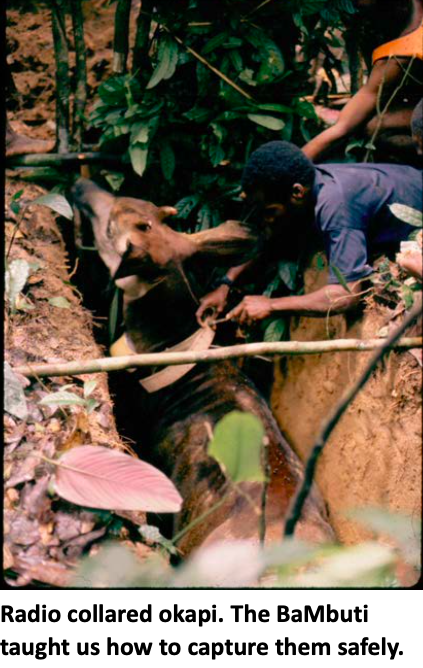
John A. Hart and Terese B. Hart
Dedicated to the discovery and conservation of Congo’s natural heritage.
John and Terese Hart have lived and worked in the Democratic Republic of Congo, formerly Zaire, since the early 1970’s. John made his first visit to the Congo as a Thomas J. Watson Fellow living with the Mbuti Pygmies in the Ituri Forest in the northeast of the country for over two years. Terese came to Congo as a Peace Corps Volunteer and taught high school in a rural community in eastern Congo between 1974 and 1976.
The Harts returned to the Ituri Forest between 1980 and 1983 to undertake field work for their Ph.D. dissertations, John’s in wildlife ecology, and Terese’s in forest ecology and botany. During this period, they built a home on the banks of the Epulu River, and laid the ground work for the first scientific research station in the region. They returned again to the Ituri Forest in 1985, as scientists with the New York Zoological Society (later to become Wildlife Conservation Society). The next 39 years of their professional career, to the present have been devoted to discovery and conservation of Congo’s unique natural heritage, and to the training and support of Congolese scientists and conservationists.
The Harts undertook some of the first field studies of Congo’s unique wildlife, including the okapi, Congo’s endemic rain forest giraffe. A particular focus, beginning with John’s research of the Mbuti pygmies in the early 1970s has been the study and management of human hunting in Congo’s forest.
In 1980, the Harts initiated permanent plots to monitor the long-term dynamics of natural forests in the Ituri. In 1993 new plots were established becoming the first African site of the Smithsonian Institution’s global forest monitoring program, and now one of the baseline sites for the understanding of carbon dynamics in tropical forests. The botanical studies led to the discovery of several new plant species and collaborations with paleo-ecologists, archaeologists and anthropologists.
Since 1989, the Harts have led expeditions into several previously little-known forest regions in Congo providing the first systematic data on several existing protected areas and leading to the establishment of new protected areas, including the Reserve de Faune à Okapis in 1992, declared a World Heritage Site in 1994, the Itombwe Reserve in 2006, and most recently the Lomami National Park in Congo’s central cuvette in 2016, the first national park in Congo established through a participatory process from local to regional and national level.
In 1991, in collaboration with the Congolese National Parks Institute, and with support form USAID, the Harts established a Center for Forest Conservation Training and Research (CEFRECOF), at Epulu in the Ituri Forest. Since 1989, the Harts have trained over 30 national scientists, including seven who have gone on to receive graduate degrees in Europe or North America.
In 2021, Terese was named by the Congolese national parks authority, ICCN, as head of the Lomami National Park, and Conservation director for Maniema Province, a post she held until she stepped back in December 2022.
The Harts graduated from Carleton College in Minnesota (John in 1972; Terese in 1973). They received their masters and doctoral degrees from Michigan State University. They were married in 1977, and have three daughters, two born in the Congo.
January, 2023

